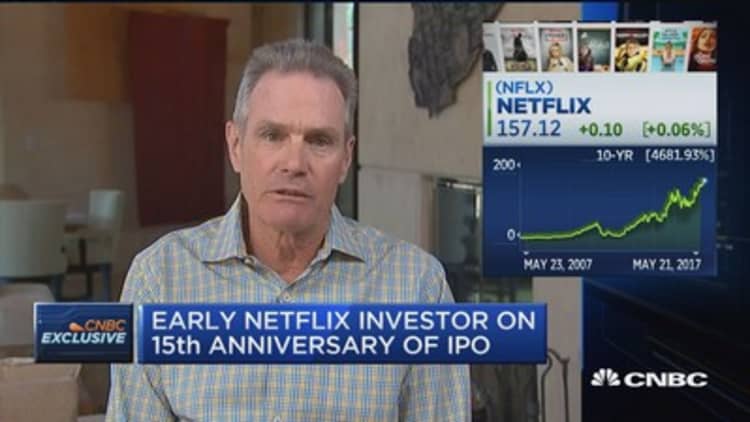
hasn't had a straight path to success.
"It was not an up-and-to-the-right story," Foundation Capital GP emeritus Mike Schuh, an early investor in the company, told CNBC.
When Netflix was founded in 1997 it was a DVD-rental service and faced tough competition. "The price competition with Blockbuster could have destroyed us," he said.
But that was only one of many challenges. "The big challenges include almost running out of money. For any CEO and any company, that's a big one," said Schuh.
Schuh attributes much of the company's success to CEO Reed Hastings' resilience and vision. "I have been incredibly fortunate to observe Reed Hastings and the Netflix team overcome incredible challenges and build a company that customers love and has changed our lives."
There are many lessons other companies, particularly those starting out in a new market, can learn from Netflix's journey, he said. Here are five of those lessons.
1) Don't back down from competition
When Netflix faced rising competition from Blockbuster, the company could easily have backed down. It was up against a behemoth in the video rental industry that was investing hundreds of millions of dollars in a competitive effort to take the start-up out of the game. Instead, the team at Netflix stayed the course, remained strategic and ultimately beat Blockbuster.
2) Hire the right people
Having the right people to do the job is valuable for obvious reasons, but it can also help when trying to get buy-in from investors. Schuh said he saw many flaws and potential pitfalls for the company early on, but it was Reed and the rest of his team that kept him optimistic.
"At some point in your investing experience, you have to accept the fact that with the right team, these issues can be dealt with," Schuh said. "Reed is an incredibly gracious ... humble guy, and he is wicked smart."
3) Create solutions for the future
One of Hastings' best qualities, according to Schuh, is his ability to think about what could be. "Reed's a visionary," said Schuh. "I don't mean in the 'I'm the smartest guy in the room' sense. I mean someone who is capable of thinking of first principles and also yet at the visionary level."
"There are plenty of smart people, but he [has] an intellectual curiosity that allows him to continue to take in new information. I think in the case of many adults, you hit an age at which that's really not possible anymore," said Schuh.
4) Know when to give up on an idea
At many companies there's no shortage of ideas, but it can be challenging to know when to let an idea go. "It's awfully hard as the CEO to tell the board ... 'I recommended this a few months ago, but it really is not working the way we thought, so we should stop,'" said Schuh. That skill is one that sets a good leader apart from a great one, he said.
"A simple way to think about how to build an early-stage company where there's no one to follow is to figure out what's working and do more of it, and to figure out what isn't working and stop it immediately," he said. "Many good CEOs are effective at the former, very few at the latter."
5) Don't be afraid to pivot
The first concept Hastings had was for a DVD rental business with a traditional pay-as-you-rent model. "Our total available market in late 1998 was one million households. It was the intersection between people who were online and [people who] own DVD players," said Schuh.
"The value proposition was you go online, you order a movie, it arrives by mail, you watch it for as long as you want and mail it back. Although it seems fairly straightforward today, it made people shake their heads," he said.
In its early
Today Netflix is a streaming-media giant that delivers video-on-demand to millions of customers worldwide.


